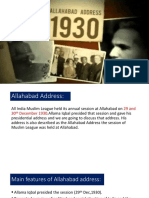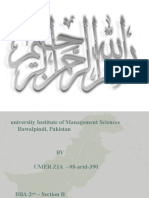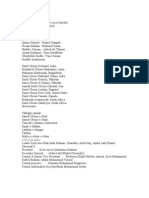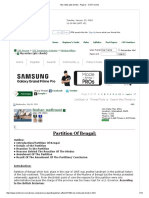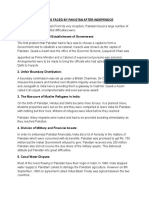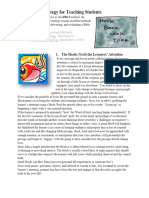Quaid e Azam and Two Nation Theory
Quaid e Azam and Two Nation Theory
Uploaded by
Prince AliCopyright:
Available Formats
Quaid e Azam and Two Nation Theory
Quaid e Azam and Two Nation Theory
Uploaded by
Prince AliOriginal Title
Copyright
Available Formats
Share this document
Did you find this document useful?
Is this content inappropriate?
Copyright:
Available Formats
Quaid e Azam and Two Nation Theory
Quaid e Azam and Two Nation Theory
Uploaded by
Prince AliCopyright:
Available Formats
Ideology of Pakistan
Quaid e Azam and two nation theory/Ideology of Islam
Personal life:
M A jinnah also known as the Quaid E Azam was born on 25 th December 1876 in Karachi. He
wassent to the Sindh madrasshah high school in 1887. He then joined the Mission High
school, Bombay from where he passed his Matriculation examination.
His father decided to send him to England to aquaire some business experience. Jinnah,
however had made his mind to receive education in law. He joined the LINCCON Inn, one of
the legal societies of England, which prepare student for Bar. In 1895 at the age of 19 he was
called to the bar. He successfully completed his studies and watched closely the British
political and parlimentory system. He used to visit the British house of commons to study its
working and system.
During his stay in England jinnah took keen interest in the Indian affaires. He took active part
in the election compaign of Dadabhai nooroji,a leading Indian nationalist when he ran for the
membership of British parliment. Dadabhai Nooroji won the election to become the first ever
Indian to be elected to the house of commons.
Jinnah returned to Karachi in 1896. By that time there was nothing for him in the father’s
business. He decided to become a Lawyer and started legel practice in Bombay. However he
had to work day and night to establish himself as the first rate lawyer.
Entry into Politics:
Jinnah first enter into the politics in 1960 by taking part in Calcutta session of the All Indian
National Congress. Jinnah joined the Congress because it aimed at secuiring self Gowerment
by adopting constitutional means.four year later jinnah was elected to the imperial legislative
council. It was the bignnning of a long and distinguished political career for jinnah.
Political Activities/Role of Jinnah:
In politics MA jinna was greatly impressed by Krishan Gopal, an eminent Congress
nationalist leader. Jinnah, being highly inspired by Gokhale, aspired to eagerly desired to
raised thestatus of India in ionternational community and to develop a sense of Indian
nationalism among the people of India. By that time he also looked after the Muslim interest.
By 1906, the Muslims of sub-continent became conscious of their separate identity. All
India Muslim league was formed with the prime objective of protecting Muslims’interests.
Quaid e Azam did not invlve in the league’s politics and kept away from it.
The Quaid E Azam joined Muslim league in 1913 only after being assured that the Muslim
league, too, was committed to the Indian freedom and self rule.
Ambassader of Hindu Muslim Unity:
[Type text] Page 1
Ideology of Pakistan
The Quaid E Azam was a great advocate of Hindu-Muslim unity. He was of the opinion
that both hindu and Muslim should make joint effort to get rid of the British rule. He did lot
of work to bring both hindu and Muslim closer. It was mainly through his effort that Muslim
league and congress began to hold their annual meeting jointly to facilitate mutual consulation
and participation. In 1915 the two organizations held their meeting in Boombay and in 1916
in Lucknow wehere the lucknow pact was concluded. Under the terms of the pact the two
organizations gave their approval to a scheme of constitutional reform. A large hartedness
was demonstrated by both Muslim league and congress. Muslim league agreed to Hindus
demand of representation while congress agreed to Muslim participation in the legislative
bodies ccording to their strength. Congress also accepted Muslim demand of separate
electorate. Jinnah’s endeavours to bring about political union of Hindus and Muslim earned
him the tittle of best ambassador of Hindus-Muslim unity.
By 1920 Gandhi had emerged as political leader. He managed to control both the
congress and home rule league. Gandhi was basically an extremist hindu politician with
highly pro-Hindu approach to politics. Due to Gandhi non cooperation movement Quaid E
Azam resigned from congress in 1920. For a few years he kept himself away from active
politics. After leaving the congress he used the Muslim league platform for the projection of
his political views. But during 1920s the Muslim league and Quaid E Azam were over
shadowed by the congress and khilafat leader.
The post khilafat period saw the rise of jinnah as a leader of the Muslims. Before that,
and even in 1916 when he as the president of league, was instrumental in bringing about the
Lucknow pact. Jinnah was a through-going nationalist. But since the mid twenties he
increasingly identified himself with Muslims and Muslim league.
Jinnah re entered active politics in 1924. He believed in the constitutional progress in
the country which he thought could be build on the bed rock of hindu Muslim unity.
A split emerged in the Muslim league over the acceptance of Simmon Commission with
jinnah acting in opposition to group led by Sir Shafi and joining hands with the congress in
boycotting the simon commission. His sincere endeavours to build hindu Muslim unity were
blatantly foiled by the publication of Nehru report which forced him to part ways with the
congress, never to seek unity with them again. Before parting ways he passionately tried to
convince the congress to incorporate his amendments in the Nehru Reporta at the national
convention convened by the congress at Calcutta that went unheeded and he was booed by the
congress participants. As the Nehru report failed to offer adequate safeguard to the Muslims,
jinnah had to come up with his famous 14 point(1929)which was restricted by the Muslims as
the basis of future Muslim demand.
Jinnah failure to bring about even minor changes in the Nehru Report over the question
of separate electorate and seats for the Muslims in legislatures League repudiated
disappointed him greatly. The Muslim league was a divided house at this moment and the
Punjab leadership repudiated jinnah’s leadership and organized itself separately under the
[Type text] Page 2
Ideology of Pakistan
leadership of Sir Muhammad Shafi. Feeling disgusted jinnah decided to leave India and settle
in England. During this period he devoted himself to legal practice appearing before the privy
council. He also represented Muslims in round table conference(1930-32).he was, however
persuaded by Liaqat Ali Khan to return the India when the constitutional changes were
introduced. He returned to India in the begining of 1935.
When Jinnah returned to India, congress was a far better organization than Muslim
League. Provincial election under the act of 1935 were held in 1937.the Quaid E Azam was
still thinking in terms of cooperation between Congress and Muslim League. The election of
1937 proved to be turning point in relation between two organizations. The Congress obtained
clear majority in six provinces. When Muslim league desired to form coalition government
with Congress, the Congress confused unless Muslim league subscribed to its creed. As a
consequences the relation between congress and Muslim league started to deteriorate and
soon Muslim discontent and disillusionment became boundless.
At this moment the Muslim of India disunited and dispaire, mass of men and women. The
congress decision of eliminating Muslim league from ministries widened the gap between the
Muslim and Hindus. Quaid e Azam was greatly pained to find congress acting in a highly
anti-Muslim behavior. He had to change his view about Hindu-Muslim unity and repudiated
his belief that India homogeneous country. He declared, ‘ Muslims can expect neither justice
nor fairplay under congress government’.
From the onward Jinnah recognized the Muslim league from being a debating party for
Muslim landed aristocracy and went to the masses for support. Within a brief period of four
years Jinnah awakened the slumbering Muslim masses, brought them on the platform and
under one banner and gave coherence to their innermost but vague urges andaspirations. The
sincere leadership of Jinnah stirred Muslim consiouseness and a hundred million people
discovered their soul and destiny. They shed their minority complex and developed a
consciousness of their own. Thus Jinnah became the unquestioned leader of Muslim
community and was elected each year as president of Muslim league. The bulk of Muslim
league all over the India supported Muslim league. They assembled under the flag of Muslim
league like a united whole and extendedthier full support to Jinnah. And it was out of sheer
gratitude for the stunning discovery of Muslim nationhood that the Muslim India hailed
Jinnah as the Quaid E Azam. Jinnah became great leader of Muslim India to take them to
their destiny of Pakistan.
Creator of Pakistan:
By 1939 the Quaid E Azam had emerged as disputed leader of Muslims who hadembarked
upon a new line of action. On December 29, 1939 soon after the registration of the congress
ministers, the Quaid E Azam gave a call to his Muslim brethren to observe the day of
deliverance and thanks giving. The call was wisely supported.
Three months later on 22-24 march, 1940 the Muslim League in its annuals meeting at Lahore
passed the famous Lahore Resolution for a separate homeland for the Muslims of India. The
[Type text] Page 3
Ideology of Pakistan
congress opposed the India of Pakistan. The Muslim under the dynamic leadership of Quaid E
Azam strove very hard to accomplish Pakistan on 14th August, 1947.
Two Nation Theory and Quaid E Azam:
Quaid E Azam was a staunch believer of Two Nation theory and considered the Muslim a
separate and distinct nation. He said. “ Pakistan was created the day the first Indian national
entered the fold of Islam”. He further said, “ The Muslim are a nation by every definition of
word nation. They have right to establish their separate homeland. They can adopt any mean
to promote and protect their economic, social, political and cultural interests.
Quaid E Azam had great stress on Islamic ideology as being the basis of the struggle for
Pakistan because he believed that Islam was the only unifying force of the Muslim Millat. He
said, “What a relationship knits the Muslim into one whole, which is the formidable rock on
which the Muslim edifies has been erected, which is the sheet anchor providing base to the
Muslim Millat, that relationship, the sheet anchor, and the rock is the Holy Quran.” In 1946
adressing a gathering at Islamia college, Peshawar, he said, “we did not demand Pakistan
simply to have a piece of land but we wanted a laboratory where we could experiment on
Islamic Principle”.
[Type text] Page 4
You might also like
- The Heresy of Salvation in A Moment - Late H.H. Pope Shenouda IIIDocument124 pagesThe Heresy of Salvation in A Moment - Late H.H. Pope Shenouda IIIDavid Arida100% (4)
- Pakistan Studies Complete NewDocument21 pagesPakistan Studies Complete NewammaraNo ratings yet
- DAVIES, Brian - Thomas Aquinas - S Summa Theologiae. A Guide and CommentaryDocument471 pagesDAVIES, Brian - Thomas Aquinas - S Summa Theologiae. A Guide and CommentaryCaio Cézar Silva100% (2)
- Questions For The PentateuchDocument4 pagesQuestions For The PentateuchHazel LagazonNo ratings yet
- Sheikh Ahmad SirhindiDocument2 pagesSheikh Ahmad Sirhindimuhammad shahgeer100% (1)
- A Day Apart - How Jews, Christians, and Muslims Find Faith, Freedom, and Joy On The SabbathDocument4 pagesA Day Apart - How Jews, Christians, and Muslims Find Faith, Freedom, and Joy On The SabbathMihăiţă-Alin BREZOIANUNo ratings yet
- The Papyrus of Ani Vol 3 PDFDocument86 pagesThe Papyrus of Ani Vol 3 PDFGarvey Lives100% (1)
- Quaid e Azam Muslim NationalistDocument14 pagesQuaid e Azam Muslim Nationalistprince12No ratings yet
- Course Title: Pak-Studies Course Code-Doctor of Physical Therapy Credit hr-2 Instructor: Miss Hina RasulDocument17 pagesCourse Title: Pak-Studies Course Code-Doctor of Physical Therapy Credit hr-2 Instructor: Miss Hina RasulRida BatoolNo ratings yet
- Downfall and RenaissanceDocument16 pagesDownfall and RenaissanceYoucef Khan0% (1)
- 5th Lecture Society & Social Str.Document19 pages5th Lecture Society & Social Str.Rida BatoolNo ratings yet
- Pakistan Resolution 1940-1Document7 pagesPakistan Resolution 1940-1ShahzaibNo ratings yet
- 1937-39 Congress MinistriesDocument5 pages1937-39 Congress Ministriesmahtab jamil akhtarNo ratings yet
- Notes PAK STUDYDocument6 pagesNotes PAK STUDYNaeem JanNo ratings yet
- Allama Iqbal and Quaid e Azam in Two Nation TheoryDocument23 pagesAllama Iqbal and Quaid e Azam in Two Nation TheorySifat ullah shah pakhtoon100% (1)
- Mujaddid Alf SaniDocument2 pagesMujaddid Alf SaniMansoor AhmedNo ratings yet
- Ideology of Pakistan With Reference To Allama Muhammad Iqbal World NotesDocument6 pagesIdeology of Pakistan With Reference To Allama Muhammad Iqbal World NotesNaimatullah Ullah100% (1)
- Pakistan ResolutionDocument5 pagesPakistan Resolutionprince12No ratings yet
- Simla Deputation 1Document5 pagesSimla Deputation 1AdeeKhan100% (1)
- Sir Syed Ahmad KhanDocument6 pagesSir Syed Ahmad KhanMahwish RabbaniNo ratings yet
- Shaikh Ahmad SarhindiDocument22 pagesShaikh Ahmad Sarhindiswift retort100% (1)
- Pakistan Studies AssignmentDocument7 pagesPakistan Studies AssignmentMuhammad Hammad Tariq0% (1)
- Lahore Resulation 1940Document2 pagesLahore Resulation 1940Arslan NazirNo ratings yet
- 1946 ElectionDocument12 pages1946 Electionumer KhalidNo ratings yet
- Cultural Heritage of Pak Css NotesDocument6 pagesCultural Heritage of Pak Css NotesMaria KhanNo ratings yet
- Sir Syed Ahmed KhanDocument4 pagesSir Syed Ahmed Khanwivaj wivajNo ratings yet
- Hazrat Mujadid Alf Sani: Sheikh Ahmed SirhindiDocument17 pagesHazrat Mujadid Alf Sani: Sheikh Ahmed Sirhindiyaseen ejazNo ratings yet
- Pakistan MovementDocument2 pagesPakistan MovementWaqar MahmoodNo ratings yet
- Causes of Decline of Muslim in SUBCONTINENTDocument8 pagesCauses of Decline of Muslim in SUBCONTINENTHamad Hussain100% (1)
- Mujadad Alf e SaniDocument5 pagesMujadad Alf e SaniHamza WaheedNo ratings yet
- Sheikh Ahmed Sarhindi - 1564 - 1624Document2 pagesSheikh Ahmed Sarhindi - 1564 - 1624Rukhsana Khan100% (2)
- Lahore Resolution 1940Document2 pagesLahore Resolution 1940MZCHOHAN100% (1)
- Allahabad AddressDocument13 pagesAllahabad AddressSaftah RehmanNo ratings yet
- The Pakistan ResolutionDocument2 pagesThe Pakistan Resolutionmini100% (1)
- Ideological Rationale With Special Reference To Sir Syed Ahmed Khan, Allama Muhammad Iqbal and Quaid-I-Azam Muhammad Ali Jinnah. Ideology of PakistanDocument7 pagesIdeological Rationale With Special Reference To Sir Syed Ahmed Khan, Allama Muhammad Iqbal and Quaid-I-Azam Muhammad Ali Jinnah. Ideology of PakistanGHAFFAR KHAN0% (1)
- Lahore ResolutionDocument3 pagesLahore Resolutionibnulwaqt100% (3)
- Sheikh Ahmad Sirhindi: ReligiousDocument4 pagesSheikh Ahmad Sirhindi: ReligiousSaima Imran KhanNo ratings yet
- Sir Syed Ahmed KhanDocument4 pagesSir Syed Ahmed KhanArslan Nazir100% (1)
- Allama IqbalDocument4 pagesAllama IqbalNeelam ZahraNo ratings yet
- Geographical Importance of PakistanDocument31 pagesGeographical Importance of Pakistanumerziabba100% (2)
- Lahore Resolution AssignmentDocument3 pagesLahore Resolution AssignmentMark Manson100% (2)
- Struggle For Islamic State and Society: An Analysis of Syed Ahmad Shaheed'S Jihad MovementDocument14 pagesStruggle For Islamic State and Society: An Analysis of Syed Ahmad Shaheed'S Jihad MovementBaqirNo ratings yet
- Dar Ul Uloom - DeobandDocument5 pagesDar Ul Uloom - DeobandahsanNo ratings yet
- The Early ProblemsDocument12 pagesThe Early ProblemsYasir Khan RajNo ratings yet
- The Two Nation TheoryDocument4 pagesThe Two Nation Theorysidra javedNo ratings yet
- Ahrar MovementDocument11 pagesAhrar MovementNavid Shah100% (2)
- Pre and Post Partition of PakistanDocument20 pagesPre and Post Partition of PakistanmishalNo ratings yet
- Political Services of Sir Syed Ahmad KhanDocument4 pagesPolitical Services of Sir Syed Ahmad KhanAbdul MajidNo ratings yet
- Aligarh MovementDocument30 pagesAligarh MovementAyesha Masood100% (1)
- Objectives of Establishment of PakistanDocument6 pagesObjectives of Establishment of PakistanKhan Ume Salma Danish100% (2)
- BPSC PDFDocument4 pagesBPSC PDFIbrahimGorgageNo ratings yet
- Allama IqbalDocument7 pagesAllama IqbalxandercageNo ratings yet
- Objective ResolutionDocument2 pagesObjective ResolutionBiya100% (1)
- My Notes (PLZ Check) - Page 2 - CSS ForumsDocument13 pagesMy Notes (PLZ Check) - Page 2 - CSS ForumsĀżiż100% (1)
- Ideology of Allama IqbalDocument4 pagesIdeology of Allama IqbalM100% (2)
- Shah Waliullah ReformsDocument2 pagesShah Waliullah ReformsMaLik HaSeebNo ratings yet
- Sir Syed Ahmed Khan Aligarh MovementDocument2 pagesSir Syed Ahmed Khan Aligarh MovementKashan Ansari60% (5)
- Lecture 22 Structure of Federal GovtDocument33 pagesLecture 22 Structure of Federal GovtalikhanNo ratings yet
- Idealogy of PakistanDocument3 pagesIdealogy of Pakistanapi-264979515No ratings yet
- Shah WaliullahDocument14 pagesShah WaliullahArshaan ShirazNo ratings yet
- Pak Russia RelationsDocument17 pagesPak Russia Relationssyeduop3510No ratings yet
- Problems After IndependenceDocument3 pagesProblems After Independencewaqar hattarNo ratings yet
- Pakistan Studies Notes For O-LevelsDocument243 pagesPakistan Studies Notes For O-Levelsshahab100% (1)
- Etika Penyiaran Dalam Perspektif Islam: Jurnal RISALAH Vol. XXIV, Edisi 2, November 2013Document9 pagesEtika Penyiaran Dalam Perspektif Islam: Jurnal RISALAH Vol. XXIV, Edisi 2, November 2013Luna BilaNo ratings yet
- Original PDF Introducing Philosophy A Text With Integrated Readings 11th PDFDocument41 pagesOriginal PDF Introducing Philosophy A Text With Integrated Readings 11th PDFthomas.young516100% (46)
- Travels 22Document3 pagesTravels 22workforyou279No ratings yet
- Hook Book Look Took 4 Part Strategy For TeachingDocument4 pagesHook Book Look Took 4 Part Strategy For TeachingnumeletrandafiruluiNo ratings yet
- Alexandria Document 2023Document11 pagesAlexandria Document 2023Matija KulenovićNo ratings yet
- The Early Middle Ages Europe 400-1000 by Rosamond McKitterick (Ed.)Document330 pagesThe Early Middle Ages Europe 400-1000 by Rosamond McKitterick (Ed.)GRONJOL100% (3)
- Feedback Musheeza LiaqatDocument7 pagesFeedback Musheeza LiaqatMusheeza LiaqatNo ratings yet
- Apostolic Tradition - Hermeneia SeriesDocument279 pagesApostolic Tradition - Hermeneia SeriesJersonneto100% (5)
- Feast of Christ The King 2022Document6 pagesFeast of Christ The King 2022Sacred-Heart winsmaNo ratings yet
- DemocracyDocument18 pagesDemocracyIvan PopovićNo ratings yet
- The Two Cultures of Maranao and Christian Are Vastly DifferentDocument1 pageThe Two Cultures of Maranao and Christian Are Vastly DifferentEarl ReyvenNo ratings yet
- Tafseer Al Baqarah Ayaat 217 218Document4 pagesTafseer Al Baqarah Ayaat 217 218Khan QuettaNo ratings yet
- Quick Path To-Great Bliss IVY-ebook-x-ILTKenDocument88 pagesQuick Path To-Great Bliss IVY-ebook-x-ILTKenFilipe LimaNo ratings yet
- History of Architecture NotesDocument3 pagesHistory of Architecture NotesKim gerald ManansalaNo ratings yet
- Cpar W3 Q1Document2 pagesCpar W3 Q1Faith Anne ObligNo ratings yet
- What's Wrong With Right Now - Talks With Sailor Bob' Adamson - 174 PgsDocument174 pagesWhat's Wrong With Right Now - Talks With Sailor Bob' Adamson - 174 PgsJoão Rocha de LimaNo ratings yet
- English 7 Activity 1Document4 pagesEnglish 7 Activity 1michameilromero13No ratings yet
- Roman Silver Saxon GreedDocument24 pagesRoman Silver Saxon GreedMikeNo ratings yet
- Module 1C TOPIC: The TrinityDocument4 pagesModule 1C TOPIC: The TrinityCarlo Jay BasulNo ratings yet
- UntitledDocument3 pagesUntitled羅文蘭No ratings yet
- Bible Verses For FearDocument1 pageBible Verses For FearSharri BurggraafNo ratings yet
- Eighth Mount Haemus Lecture PDFDocument40 pagesEighth Mount Haemus Lecture PDFMarian Ganciu100% (1)
- The Individual and The StateDocument20 pagesThe Individual and The StateCyrelle Ann Kae ValenciaNo ratings yet
- Q1 - Enrichment Module 3Document1 pageQ1 - Enrichment Module 3DorothySantosTomaCruzNo ratings yet
- History of HalloweenDocument9 pagesHistory of HalloweenCooterTasteTesterNo ratings yet
































